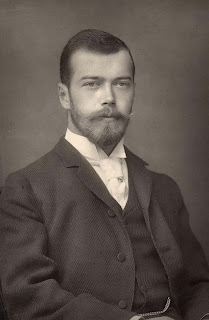Sources:
La Russie des tsars pendant la grande guerre, volume 1, pages 15 to 19, by Maurice Paléologue, 1921
An Ambassador's Memoirs, by Maurice Paléologue, translated by F. A. Holt, 1925
The diary entry:
Jeudi, 23 juillet 1914.
... Ce soir, dîner d'adieu à bord de la France. Aussitôt après, l'escadre française appareillera pour Stockholm.
L'impératrice s'est fait un devoir d'accompagner l'empereur. Tous les grands-ducs et toutes les grandes-duchesses sont là.
Vers sept heures, une bourrasque passagère a quelque peu endommagé la décoration florale du pont. Néanmoins, l'aspect de la table est fort beau: il a même une sorte de grandeur terrifiante, lorsqu'on regarde les quatre gigantesques canons de 304 millimètres qui allongent leurs volées énormes au-dessus des convives. Le ciel s'est déjà rasséréné; une brise légère caresse les flots; la lune se lève à l'horizon. ...
... Je me trouve ... rester seul auprès de l'impératrice, qui me fait asseoir sur un fauteuil, à sa gauche. La pauvre souveraine semble épuisée de fatigue. Avec un sourire contracté, elle me dit, d'une voix blanche:
— Je suis heureuse d'être venue ce soir... Je craignais beaucoup d'orage... La décoration du bateau est magnifique... Le président aura beau temps pour sa traversée...
Mais soudain, elle porte les mains à ses oreilles. Puis timidement, avec un air douloureux et suppliant, elle me montre la musique de l'escadre qui, tout près de nous, vient d'attaquer un allegro furieux à grand renfort de cuivres et de grosses caisses:
— Ne pourriez-vous pas? ... murmure-t-elle.
Je devine d'où lui vient son malaise et je lance un signe brusque au chef de musique qui, sans y rien comprendre, arrête net son orchestre.
— Oh! merci, merci! me dit l'impératrice en soupirant.
La jeune grande-duchesse Olga, qui est assise à l'autre bord du navire avec le reste de la famille impériale et les membres de la mission française, nous observe depuis quelques instants, d'un œil inquiet. Prestement, elle se lève, glisse vers sa mère avec une grâce agile et lui insinue deux ou trois mots tout bas. Puis, s'adressant à moi, elle poursuit:
— L'impératrice est un peu fatiguée, mais elle vous prie, monsieur l'ambassadeur, de rester auprès d'elle et de continuer à lui parler.
Tandis qu'elle s'éloigne, à petits pas légers et rapides, je reprends la conversation. A ce moment précis, la lune apparaît, dans un archipel de nuages floconneux et lents: tout le golfe de Finlande en est illuminé. Mon thème est trouvé; je vante les charmes des voyages en mer. L'impératrice m'écoute, silencieusement, le regard vide et tendu, les joues marbrées, les lèvres inertes et gonflées. Après une dizaine de minutes qui me semblent interminables, l'empereur et la président de la République descendent de la passerelle. ...
English translation (by Holt):
Thursday, July 23, 1914.
... This evening we had a farewell dinner on the France. The moment it was over the French squadron was to prepare to leave for Stockholm.
The Tsaritsa had made a point of coming with the Tsar. All the grand dukes and grand duchesses were there.
About seven o'clock a momentary squall did some slight damage to the floral decorations of the deck, but the table looked very fine all the same. It had indeed a kind of terrifying grandeur with the four gigantic 30 mm. gun raising their huge muzzles above the heads of the guests. The sky was soon clear again; a light breeze kissed the waves; the moon rose above the horizon. ...
... I found myself alone with the Tsaritsa, who asked me to take a chair on her left. The poor lady seemed worn out. With a forced smile she said in a tired tone:
"I'm glad I came to-night... I was afraid there would be a storm... The decorations on the boat were magnificent... The President will have lovely weather for his voyage..."
But suddenly she put her hands to her ears. Then with a pained and pleading glance she timidly pointed to the ship's band quite near to us which had just started on a furious allegro with a full battery of brass and big drums.
"Couldn't you? ..." she murmured.
I guessed the cause of her trouble and signalled sharply to the conductor, who did not understand but stopped his band at once.
"Thank you, thank you!" sighed the Tsaritsa.
The young Grand Duchess Olga, who was sitting at the other end of the ship with the rest of the imperial family and the members of the French mission, had been observing us for some minutes with an anxious eye. She suddenly rose, glided towards her mother with graceful ease and whispered two or three words in her ear. Then, addressing me, she continued:
"The Empress is rather tired, but she asks you to stay with her, Monsieur l'Ambassadeur, and to go on talking to her."
I resumed our conversation as she went off with quick, light steps. At that very moment the moon appeared in an archipelago of flaky, slow-moving clouds. The whole Gulf of Finland was lit up. My subject was found for me. I enlarged on the charm of sea voyages. The Tsaritsa listened to me in silence, her gaze vacant and strained, her cheeks livid, her lips motionless and swollen. After ten minutes, or so which seemed to me an eternity, the Tsar and the President of the Republic came down from the bridge. ...
Above: Alexandra. Photo courtesy of Ilya Chishko on Flickr.
Above: Olga.
Above: Maurice Paléologue.






































